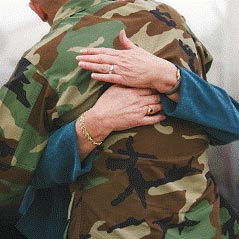 – We can honor our veterans and ourselves by fighting stigma together. It’s a battle we know we can win. –
– We can honor our veterans and ourselves by fighting stigma together. It’s a battle we know we can win. –
By Rosalynn Carter and Patrick Kennedy in The Atlanta Journal-Constitution
This Veterans Day, Americans will pay tribute to our military veterans, the men and women who have returned home from Iraq and Afghanistan. We will remember also those who still serve. However, truly honoring our armed forces means doing all we can to help address the disturbing trends of suicide, family violence, substance abuse, post-traumatic stress disorder, depression and other mental health conditions found among our troops as a result of combat. Although they often are invisible, combat-related neurological injuries are wounds of war nonetheless and should be treated with the same urgency as we would treat other injuries.
The Carter Center recently held a national symposium on the reintegration of veterans into families, communities and the workplace. A recurring theme in the meeting was the damaging effect of stigma and discrimination on the health of veterans and their families.
According to a recent study, the rate of suicide among the military actually has surpassed that of the general public. These needless deaths are particularly devastating for the survivors, considering that a soldier’s safe return should have meant that he or she had successfully escaped harm.
Fortunately, effective treatments are available for even the most serious neurological illnesses. But many soldiers avoid treatment for fear of being perceived as weak by their colleagues or because of concerns that a history of mental illness may prevent them from advancing in their military career.
The armed services are working to change this perception and encourage soldiers to get help. Leaders like Staff Sgt. Megan Krause and Maj. Gen. David Blackledge (realwarriors.net) have come forward with their own experiences and battles with mental illness. But much more needs to be done.
The extraordinary achievements made by our neuroscientists and brain researchers have made it clear beyond a shadow of a doubt that the conditions once classified as “mental” are indeed physiological. The military should classify war-related brain disorders as what they are — combat wounds — and accordingly should reconsider its policy against awarding the Purple Heart to veterans with chronic war-related mental health conditions.
Removing the false distinction for mental illness and making these policy changes would play a major role in overcoming stigma and encourage more soldiers to seek help when they need it, improving the overall health of our fighting forces. We know that providing treatment services early on in the course of these illnesses not only costs less but also improves the life trajectory for those receiving treatment. No one should have to wait for a crisis to receive services.
The neurological illnesses affecting veterans impact an estimated 100 million Americans and are costing our nation more than $1 trillion annually. Neuroscience research can provide valuable tools to repair and prevent these combat injuries, while putting an end to the notion that an illness of the brain is just an illusion to be willed away. We are at a stage in biomedical research where there can be real hope, confidence even, that with proper funding, scientists can devise treatments and cures that will spare veterans and their loved ones the agony that now accompanies living with PTSD. New research into depression, substance abuse and brain disorders are creating opportunities for healthier lives for all who face these challenges.
We can honor our veterans and ourselves by fighting stigma together. It’s a battle we know we can win.
Former first lady Rosalynn Carter is co-founder of the Carter Center.
U.S. Rep. Patrick Kennedy, D-R.I., authored the 2008 Mental Health Parity and Addiction Equity Act.
ATTENTION READERS
We See The World From All Sides and Want YOU To Be Fully InformedIn fact, intentional disinformation is a disgraceful scourge in media today. So to assuage any possible errant incorrect information posted herein, we strongly encourage you to seek corroboration from other non-VT sources before forming an educated opinion.
About VT - Policies & Disclosures - Comment Policy



